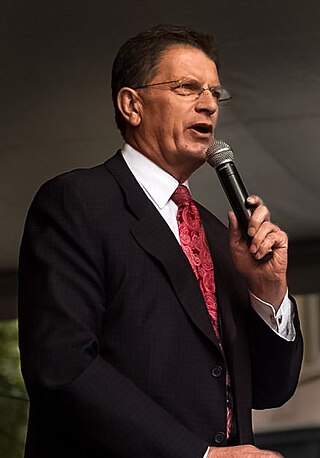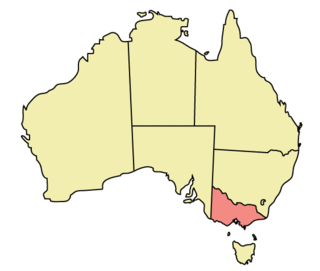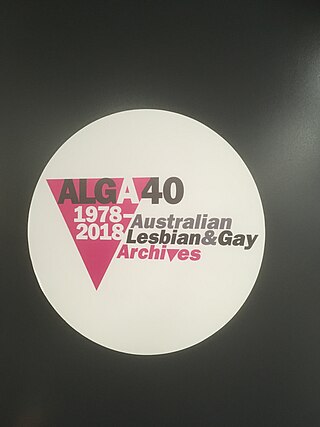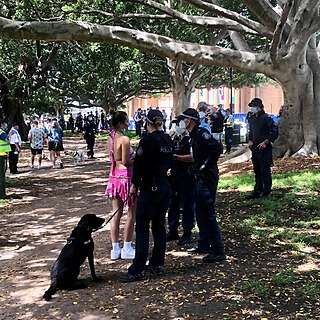
The Australian Federal Police (AFP) is the national and principal federal law enforcement agency of the Australian Government with the unique role of investigating crime and protecting the national security of the Commonwealth of Australia. The AFP is an independent agency of the Attorney-General's Department and is responsible to the Attorney-General and accountable to the Parliament of Australia. As of October 2019 the Commissioner of the Australian Federal Police is Reece Kershaw, formerly the Northern Territory Police Commissioner.
JOY 94.9, stylised as JOY or JOY 94.9, is a community radio station broadcasting at 94.9 FM in Melbourne. It is Australia's first and only LGBTQI+ community radio station.

A strip search is a practice of searching a person for weapons or other contraband suspected of being hidden on their body or inside their clothing, and not found by performing a frisk search, but by requiring the person to remove some or all clothing. The search may involve an official performing an intimate person search and inspecting their personal effects and body cavities. A strip search is more intrusive than a frisk and requires legal authority. Regulations covering strip searches vary considerably and may be mandatory in some situations or discretionary in others.
The following lists events that happened during 1994 in Australia.

Tourism is a significant industry in the state of Victoria, Australia. The country's second most-populous city, Melbourne was visited by 2.7 million international overnight visitors and 9.3 million domestic overnight visitors during the year ending December 2017.

Edward Norman Baillieu is a former Australian politician who was Premier of Victoria from 2010 to 2013. He was a Liberal Party member of the Victorian Legislative Assembly from 1999 to 2014, representing the electorate of Hawthorn. He was elected leader of the Liberal Party in opposition in 2006, and served as Premier from 2010 until 2013 after winning the 2010 state election. He resigned as Premier on 6 March 2013, and was succeeded by Denis Napthine.
The Critical Incident Response Team (CIRT) is a specialist unit of the Victoria Police that provides assistance to general duties police, including a negotiator capability, to resolve high risk incidents utilising specialist tactics and equipment. CIRT was formed to conduct regular patrols of metropolitan Melbourne 24-hours, seven-day-per-week, ready to rapidly respond to incidents in Melbourne, and if necessary, in regional Victoria, by a small team of officers. CIRT has evolved to include conducting planned operations for high risk searches and arrests.

Will Fowles is an Australian politician. He has been a member of the Victorian Legislative Assembly since November 2018, initially representing the seat of Burwood in Melbourne's eastern suburbs. Ahead of the 2022 Victorian state election, the seat of Burwood was abolished by Victoria's Electoral Boundaries Commission, leading Fowles to stand for the seat of Ringwood, where he resides with his family.
John Houssam Ibrahim is a former Kings Cross nightclub owner in Australia. Police allege Ibrahim is a "major organised-crime figure" and was labelled as the "lifeblood of the drugs industry of Kings Cross" during the 1995 Wood royal commission. However, Ibrahim strongly denies this, and has not been convicted of any related crime.
The Rainbow Lounge raid occurred in the early morning hours of June 28, 2009, at the Rainbow Lounge, a newly opened gay bar in Fort Worth, Texas. The raid was carried out by members of the Texas Alcoholic Beverage Commission (TABC) and the Fort Worth Police Department. Several customers were arrested for public intoxication and one customer, Chad Gibson, received a severe head and brain injury while in custody. The police also claimed the customers made sexual advances and contact with them. Other customers were detained and later released without arrest.

The Australian state of Victoria is regarded as one of the country's most progressive jurisdictions with respect to the rights of lesbian, gay, bisexual, and transgender (LGBTQ) people. Victoria is the only state in Australia, that has implemented a LGBTIQA+ Commissioner.

The Australian Queer Archives (AQuA) is a community-based non-profit organisation committed to the collection, preservation and celebration of material reflecting the lives and experiences of lesbian, gay, bisexual, transgender and intersex LGBTI Australians. It is located in Melbourne. The Archives was established as an initiative of the 4th National Homosexual Conference, Sydney, August 1978, drawing on the previous work of founding President Graham Carbery. Since its establishment the collection has grown to over 200,000 items, constituting the largest and most significant collection of material relating to LGBT Australians and the largest collection of LGBT material in Australia, and the most prominent research centre for gay, lesbian, bisexual, trans and intersex history in Australia.
Anna Shelley Brown is a lawyer and advocate, particularly in the area of LGBTIQ rights. After working for the Human Rights Law Centre for around seven years, in December 2018 she was appointed chief executive of new LGBTI advocacy organisation Equality Australia
The Atlanta Eagle police raid was a police raid targeting the Atlanta Eagle, a gay bar in Atlanta, Georgia, United States. The raid occurred on September 10, 2009, due to anonymous tips alleging that illegal drug use and sex was occurring at the bar. Several dozen officers were involved in the raid, including members of the Atlanta Police Department's vice squad and the "Red Dog Unit", a SWAT-like unit typically used in high drug use areas. None of the 62 bar patrons that night were arrested, although eight employees were. Seven of these employees were either found not guilty or had charges dropped against them, while one was not present at the trials and had a bench warrant issued against him.
The Otherside Lounge bombing was a domestic terrorist pipe bombing attack that occurred on February 21, 1997, in Atlanta, Georgia, United States. At approximately 9:45 p.m., a bomb exploded at the Otherside Lounge lesbian bar that damaged the building and destroyed several cars in the parking lot. While no one was killed, five people were injured, including one critically injured patron. The bombing had been carried out by Eric Rudolph, a serial bomber who had previously committed the Centennial Olympic Park bombing in 1996 that was responsible for two deaths, and he had targeted the nightclub due to his strong opposition to the gay rights movement.
Gavin Campbell is an Australian club DJ and remixer based in Melbourne, Victoria. He created the dance music production outfit known as Filthy Lucre, which is known for its 1991 remix of Yothu Yindi's single "Treaty", known as "Treaty ".

The New South Wales Police Force strip search scandal refers to an ongoing policing scandal surrounding the routine and arbitrary use of strip searches by members of the New South Wales Police Force.
The Village Station police raid was a police raid that targeted the Village Station, a gay bar in Dallas, Texas, United States. The raid occurred on October 25, 1979, and saw several bar patrons arrested for public lewdness while performing a bunny hop dance. The raid and the subsequent court cases involving those arrested are considered an important moment in the LGBT history of Dallas, with the impact it had on the city compared to that of the Stonewall riots of 1969.
The Fun Lounge police raid was a 1964 police raid that targeted Louie's Fun Lounge, a gay bar near Chicago, Illinois, United States. The raid led to the arrest of over 100 individuals and is considered a notable moment in the LGBT history of the area.








